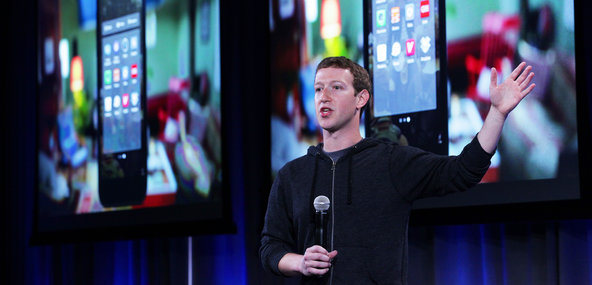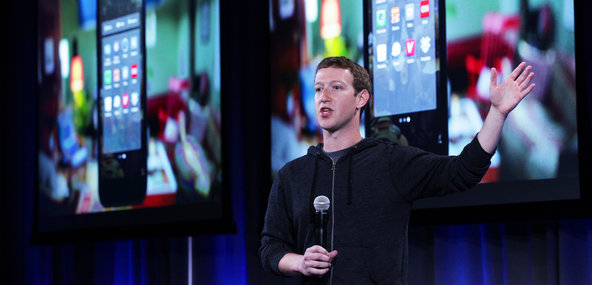The social networking company said Wednesday that it had revved up its mobile advertising from virtually nothing a year ago to 41 percent of its total ad revenue of $1.6 billion in the second quarter.
“Soon we’ll have more revenue on mobile than desktop,” Mark Zuckerberg, Facebook’s founder and chief executive, said in a conference call with analysts.
Facebook’s results elated investors, who sent the company’s stock up nearly 17 percent, to $30.94, in after-hours trading.
Analysts said the strong performance dissipated lingering worries that the company could not adapt to the current Internet environment, in which users are relying more on mobile devices instead of personal computers to access the information they want.
Those concerns have dogged the company since its disappointing initial public offering in May 2012, in which it sold shares at $38 and then saw them fall by half.
“One of the biggest overhangs from their I.P.O. is that this company had been blindsided by mobile,” said Mark Mahaney, an analyst with RBC Capital Markets. “They caught up. Instead of being behind the curve on mobile, they are ahead of the curve.”
The company said it had net income of $333 million, or 13 cents a share, in the second quarter. Excluding stock-based compensation expenses, profits were $488 million or 19 cents a share, compared with $295 million, or 12 cents a share, in the second quarter a year ago.
The company’s revenue soared 53 percent, to $1.81 billion.
Facebook had particularly strong demand for ads that appear in its users’ news feeds, the flow of updates from friends that they see when they log on. About 1 in 20 posts in the news feed is an ad, and advertisers cannot seem to get enough of them.
The company expects those ads to continue to grow in the second half, its chief financial officer, David Ebersman, said in a conference call with analysts.
One concern for the future is whether Facebook will annoy its users if it significantly increases the number of ads in news feeds, said Debra Aho Williamson, an analyst with eMarketer, a research firm.
“How many ads will people tolerate?” she asked.
Mr. Zuckerberg said Facebook’s studies had shown that users were noticing ads more, and the company was working to improve the quality and relevance of ads.
Facebook is also studying when and how to introduce video ads, which are expected to command at least several hundred thousand dollars each.
“We have nothing to announce today,” Facebook’s chief operating officer, Sheryl Sandberg, said in an interview. But she said video was “tremendously important” for users as well as marketers. Videos made and shared through Facebook’s new video feature in Instagram are growing quickly.
The company’s results also show how its users are continuing to shift toward mobile phones and tablets to use the site instead of a computer’s Web browser. Although the company’s total number of active monthly users worldwide grew slightly from the first quarter, to 1.15 billion, the number of people who use its mobile versions at least once a month grew 9 percent, to 819 million in that time.
Total ad revenue, a crucial measure watched by Wall Street, was $1.6 billion, up 61 percent from the second quarter of 2012. Of total ad revenue, 41 percent came from mobile, up from 30 percent in the first quarter.
“I think this shows that all the questions that people might have had in the past about whether Facebook could monetize on mobile devices, they’ve settled definitively,” Ms. Williamson said.
Users’ preference for reading Facebook on the go has created special revenue opportunities, like ads that prompt users to install mobile apps like games. But advertisers are generally willing to pay much less for a mobile ad than they are for the desktop.
The company’s sharp revenue growth reflects increased competition among advertisers to reach Facebook’s large user base, said Rob Jewell, chief executive of Spruce Media, a firm that helps advertisers like McDonald’s and the insurer Progressive to buy ads on the social network and measure their effectiveness.
Facebook’s ad rates are generally set through a bidding process, and Mr. Jewell said that his clients paid about 10 percent more on average for ads in the second quarter than in the first quarter. Ads in the news feed, both on the desktop and mobile versions of Facebook, were in particularly high demand, with rates up about 75 percent from the first quarter for both categories, he said.
“Facebook is the best channel for mobile app advertisers to purchase advertising,” Mr. Jewell said.
In the second quarter of 2012, the company reported a net loss of $743 million, or 8 cents a share. But that figure included $1.3 billion in compensation expenses related to the company’s initial public offering. In the year ago quarter, Facebook’s revenue was $1.2 billion.
The company far exceeded Wall Street’s expectations. Analysts had predicted the company would report earnings of 14 cents a share, excluding stock compensation costs, on revenue of $1.62 billion, according to a survey by Thomson Reuters.
Facebook’s surprisingly strong second-quarter earnings contrasted with those of Google, which last week reported disappointing profits in mobile advertising.
While the two companies are not strictly comparable because Facebook is expanding its ads from a much a smaller base, Ronald Josey, an analyst at JMP Securities, said Facebook was doing extremely well in mobile categories like ads prompting users to install new mobile applications.
“This company is becoming more and more of a mobile company,” he said.

This article has been revised to reflect the following correction:
Correction: July 24, 2013
An earlier version of this article misstated the title of Rob Jewell. He is the chief executive of Spruce Media, not the president.
Article source: http://www.nytimes.com/2013/07/25/technology/facebook-beats-expectations-on-strong-mobile-growth.html?partner=rss&emc=rss





